GREETINGS FROM RUSTON: A Post Card History of Ruston, Louisiana
 |
| First Baptist Church, 1920s |
The book tells the city's history with the use of over 100 vintage post cards and interesting anecdotes. Many of the post cards are over one hundred years old.
The book is available through http://www.amazon.com/ (see the link), by e-mailing me at campruston@gmail.com and at these Ruston businesses:
Townsend House Gifts
Karen's Hallmark
Ruston Chamber of Commerce/Visitor's Bureau
Rumo's Barber Shop
Get yours soon!














